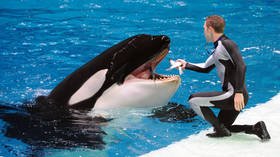Russian MP moves to ban poaching of killer whales & dolphins in bid to shut vibrant but controversial marine mammal park industry

A leading Russian parliamentarian has proposed a new bill to ban the catching of marine mammals, which would eventually lead to the closure of the country’s many dolphinaria as collections could no longer be replenished.
Authored by State Duma deputy Svetlana Bessarab, of the ruling United Russia party, the bill would prevent the practice of taking mammals such as dolphins, seals, and killer whales into captivity, including for educational purposes. The aim is to stop the poaching of animals that have evolved to live in a large oceanic territory. Over time, as the animals currently affected eventually die, institutions with marine mammals would be forced to close.
While the practice is already illegal in many countries around the world, dolphinariums are a fixture of Russian resort towns. Furthermore, poachers also sell around 100 animals a year to China, for about $2 million each.
Also on rt.com Big money makes solutions tough, Putin says, as first captured belugas and orcas are releasedAs things stand, capturing marine mammals is already highly regulated, with purchasing from illegal poachers completed banned. However, according to Bessarab, there is now an absurd situation where state agencies seize animals from criminals and then hand them over to dolphinariums for ‘safekeeping’, despite these institutions not being equipped to rehabilitate the animals.
In 2018, activists discovered around 100 whales living in tightly packed aquatic ‘pens’ in Russia’s Far East. The animals were later declared as having been illegally captured, and the local governor said they would all be released back into the wild. In November 2019, the last of the captured whales were finally returned to their ocean home.
Like this story? Share it with a friend!














